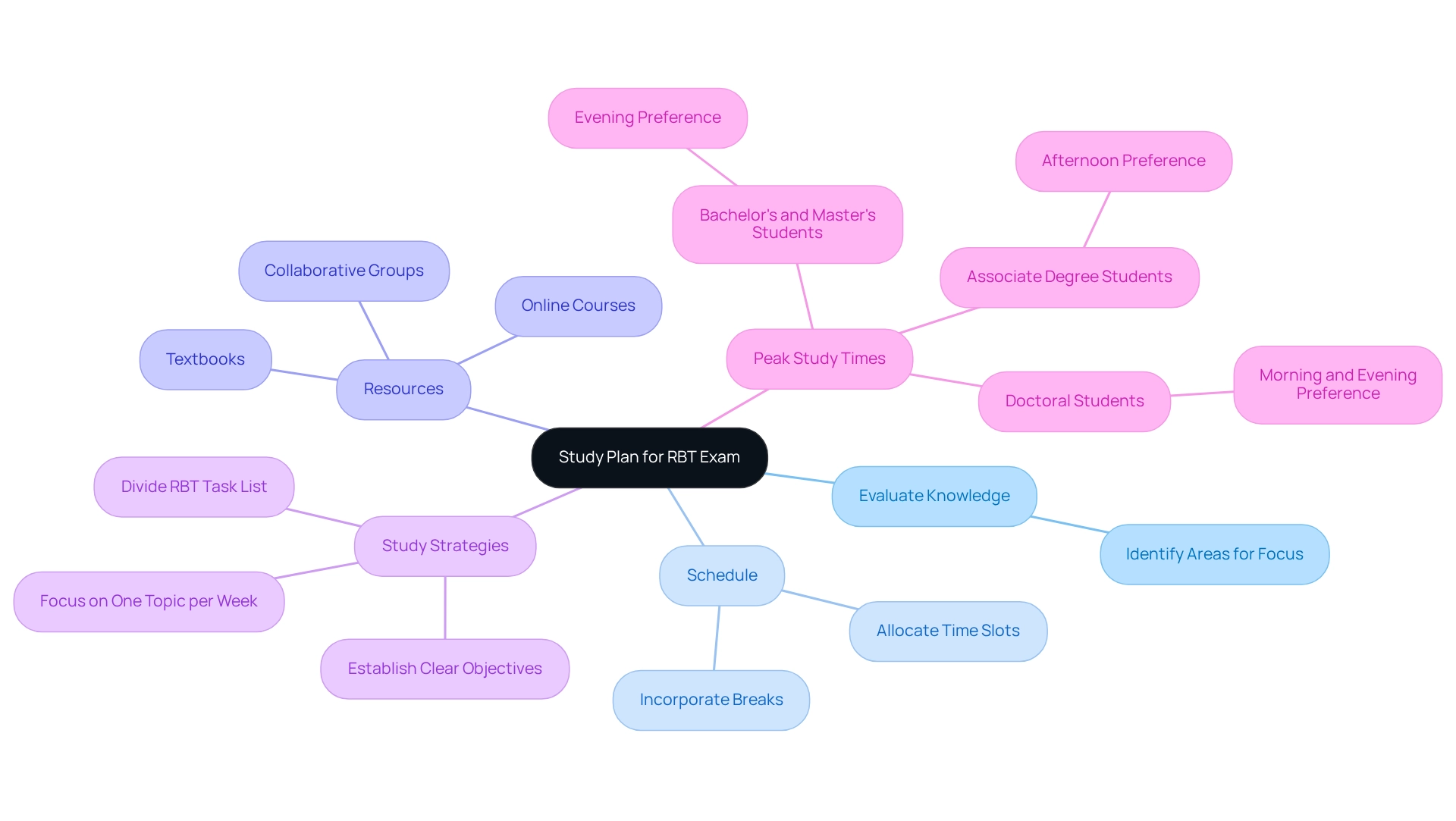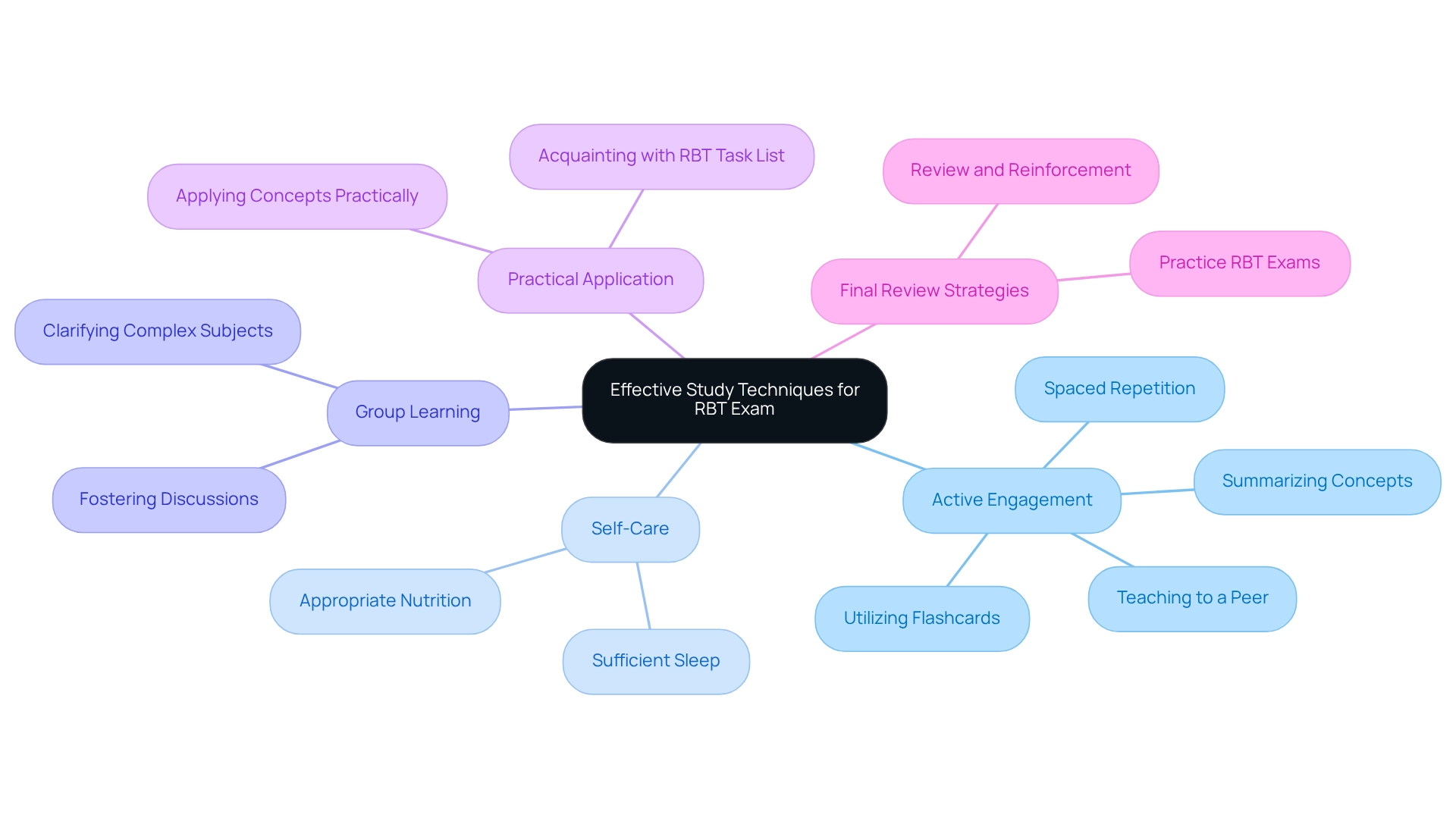May 31, 2025

The article delineates four pivotal steps to effectively prepare for the RBT exam.
Each step is substantiated by compelling evidence, underscoring its importance and ultimately fostering candidates' confidence and readiness for the assessment.
In the competitive landscape of Applied Behavior Analysis (ABA), aspiring Registered Behavior Technicians (RBTs) encounter a pivotal challenge: passing the RBT exam. This certification not only validates their expertise but also unlocks a wealth of career opportunities in a field that is experiencing remarkable growth. With job prospects projected to soar and the demand for skilled professionals increasing, mastering effective preparation for the RBT exam is essential.
How prepared are you to tackle this challenge? Crafting a tailored study plan, utilizing effective study techniques, and practicing with mock exams are crucial steps in enhancing preparation. This guide presents comprehensive strategies designed to boost confidence and ultimately lead to success in this rewarding career path. Embrace the opportunity to excel in your future endeavors.
The practice RBT exam is an essential assessment for those looking to forge a career in Applied Behavior Analysis (ABA). This assessment serves as a practice RBT exam that rigorously evaluates candidates on their understanding and skills necessary for delivering behavior-analytic services under the supervision of (BCBA). Recognizing the assessment's purpose is vital; it not only validates the competencies of aspiring RBTs but also significantly enhances their career prospects in a field expected to experience substantial growth.
With the demand for Registered Behavior Technicians soaring, the RBT certification stands as a foundational level of expertise that opens doors to a variety of job opportunities, including leadership positions and flexible work arrangements. Notably, the job growth rate for RBTs is projected to be between 12% to 22% over the next decade, vastly surpassing the average job growth rate of 5%. This trend underscores the importance of the practice RBT exam as a crucial stepping stone for career advancement in ABA therapy, establishing it as a pivotal milestone for professionals striving for success in this dynamic field.
To delve deeper into these opportunities, consider submitting your resume to stay updated on high-demand positions within the expanding ABA market. Are you ready to take the next step in your career? The RBT certification could be your gateway to a rewarding future.
To develop a successful preparation strategy for the , it is crucial to begin by evaluating your existing knowledge and identifying areas that require additional focus.
Ralph Moller emphasizes, 'Incorporating these resources into the learning routine can lead to a more comprehensive understanding of the content for the practice RBT exam and increase the likelihood of success.'
A recommended method is to divide the RBT Task List into manageable portions, establishing clear objectives for each learning session. For instance, focusing on one topic per week allows time for review and practice questions. This structured approach not only enhances retention but also builds confidence as you progress.
Furthermore, it's important to recognize that students have indicated diverse peak learning times depending on their degree level, which can inform your preparation timetable. This structured approach is vital, particularly given the significant role of the practice RBT exam in entering the field of behavior analysis.

To enhance your learning effectiveness for the RBT exam, actively engage with the material. Techniques such as:
are essential. Implementing spaced repetition—reviewing material at increasing intervals—can significantly boost memory retention. Prioritize self-care by ensuring sufficient sleep and appropriate nutrition; these elements are vital for optimal cognitive function during your learning sessions. Group learning sessions can also prove beneficial, fostering discussions that clarify complex subjects and reinforce comprehension.
Acquainting yourself with the RBT Task List and applying concepts in practical situations will deepen your understanding and prepare you for the assessment. According to the case analysis titled 'Final Review Strategies Before the RBT Exam,' final review tactics, such as practice RBT exams, help reinforce knowledge and enhance confidence, ultimately resulting in better performance. Statistics indicate that a slight can elevate 'leavers' to the performance level of 'persisters,' underscoring the effectiveness of these learning strategies. As Stuart Duncan aptly puts it, "Autism is my superpower," reminding us of the diverse perspectives that enrich the field of ABA therapy.
Don't forget to utilize the RBT study guide alongside these effective study strategies, including the practice RBT exam, to maximize your chances of success.

Practicing with mock exams is an essential step in your preparation for the practice RBT exam. Did you know that candidates who consistently train with practice tests can experience an average score enhancement of up to 20%? This statistic underscores the importance of incorporating into your study routine. Start by taking a baseline practice test to identify your strengths and weaknesses. Utilize this information to customize your learning plan, concentrating on areas that require enhancement. Aim to replicate the real test atmosphere by timing yourself and following the test's format.
Resources like online practice tests and study groups can offer valuable feedback and assistance. After finishing each practice test, review your answers thoroughly to understand any mistakes and reinforce your learning. This iterative process not only develops familiarity with the test structure but also enhances your confidence as you approach the test date.
Consider the case study titled 'Documentation and Reporting,' where an RBT realized they had forgotten specific details for documentation after a session. They sought guidance on how to proceed, highlighting the importance of clear communication and documentation in behavior analysis. As the RBT exam is designed to evaluate candidates' knowledge and abilities to deliver behavior analysis services effectively, engaging in a practice RBT exam becomes a vital component of your preparation. Are you ready to enhance your study strategy and maximize your chances of success?
The journey to becoming a Registered Behavior Technician (RBT) is both challenging and rewarding, with the RBT exam serving as a critical milestone in this process. Understanding the exam's purpose highlights its role in validating essential skills and enhancing career prospects within the rapidly growing field of Applied Behavior Analysis (ABA). With a projected job growth significantly higher than the national average, passing the RBT exam opens doors to numerous opportunities, making effective preparation indispensable.
Creating a tailored study plan is essential for success. By assessing knowledge gaps and allocating specific study times, individuals can enhance their learning and retention. Employing diverse resources and breaking down the RBT Task List into manageable sections fosters a structured approach that builds confidence and comprehension. Additionally, effective study techniques, such as summarizing concepts, engaging in group discussions, and utilizing spaced repetition, can further solidify understanding and prepare candidates for the exam.
Finally, practicing with mock exams is a crucial strategy for familiarizing oneself with the exam format and identifying areas for improvement. This iterative process not only boosts confidence but also significantly enhances performance, as evidenced by research demonstrating notable score improvements among regular practitioners. By embracing these comprehensive strategies, aspiring RBTs can approach the exam with confidence, paving the way for a successful and fulfilling career in ABA.
What is the purpose of the practice RBT exam?
The practice RBT exam is designed to rigorously evaluate candidates on their understanding and skills necessary for delivering behavior-analytic services under the supervision of a Board Certified Behavior Analyst (BCBA). It validates the competencies of aspiring RBTs and enhances their career prospects in Applied Behavior Analysis (ABA).
How does the RBT certification impact job opportunities?
The RBT certification serves as a foundational level of expertise that opens doors to various job opportunities, including leadership positions and flexible work arrangements.
What is the projected job growth rate for Registered Behavior Technicians (RBTs)?
The job growth rate for RBTs is projected to be between 12% to 22% over the next decade, significantly higher than the average job growth rate of 5%.
Why is the practice RBT exam considered a crucial stepping stone for career advancement in ABA therapy?
The practice RBT exam is considered a crucial stepping stone because it establishes essential competencies for aspiring RBTs, thereby facilitating career advancement in the growing field of ABA therapy.
How can candidates stay updated on job opportunities in the ABA market?
Candidates can submit their resumes to stay updated on high-demand positions within the expanding ABA market.
What is the overall significance of the RBT certification in the field of ABA?
The RBT certification is significant as it enhances career prospects and is expected to play a pivotal role in the professional success of individuals in the dynamic field of Applied Behavior Analysis.
Our expert recruitment strategies and AI-driven sourcing ensure that you receive top-notch candidates quickly, without compromising on quality. Whether you’re looking for BCBAs, Clinical Directors, or RBTs, we’ve got you covered.